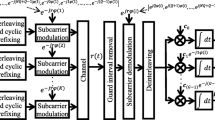Abstract
Most modulated signals are cyclostationary, which results in redundancy in the signal frequency spectrum. In this paper, the spectral redundancy which exists in Code Division Multiple Access (CDMA) signals is used in the receiver to improve performance. In particular, we employ a Frequency Shift-Decision Feedback Equalizer (FRESH-DFE) to exploit the cyclostationary. We show that FRESH-DFE is superior to conventional DFE in multiple access CDMA systems, including long code systems.
Similar content being viewed by others
References
A. Leon-Garcia, Probability and Random Processes for Electrical Engineering, 2nd (ed). Englewood Cliffs, NJ: Prentice-Hall, 1994.
F. Hendessi, On the Theory of FRESH DFE and its Application in Digital Cellular Radio Systems, PhD Thesis, Department of Systems and Computer Engineering, Carleton University, Ottawa, Canada, 1994.
W.A. Gardner, Introduction to Random Processes with Application to Signals and Systems, 2nd (ed). New York, NY: McGraw-Hill, 1990.
L.E. Franks and W.A. Gardner, “Estimation for Cyclostationary Random Processes”, Proc. Allerton Conf. Circuit and System Theory, pp. 222–231, 1971.
W.A. Gardner, Statistical Spectral Analysis: A Non-Probability Theory Englewood Cliffs, NJ: Prentice-Hall, 1988.
J.H. Reed and T.C. Hsia, “The Performance of Time Dependant Adaptive Filters for Interference Rejection”, IEEE Trans. Acoustic, Speech, and Signal Proc., Vol. 38, pp. 1373–1385, Aug. 1990.
J.H. Reed, Time-Dependant Adaptive Filters for Interference Rejection, Ph.D. Dissertation, Department of Electrical Engineering and Computer Science, University of California, Davis, Dec. 1987.
W.A. Brown, On the Theory of Cyclostationary Signals, Ph.D. Dissertation, Department of Electrical Engineering and Computer Science, University of California, Davis, Sep. 1989.
W.A. Gardner, “Cyclic Wiener Filtering: Theory and Method”, IEEE Trans. Commun., Vol. 41, No. 1, pp. 151–163, Jan. 1993.
W.A. Gardner and W.A. Brown, “Frequency-Shift Filtering Theory for Adaptive Co-channel Interference Removal”, Proc. Asilomar Conference on Signals, Systems and Computers, pp. 562–567, Nov. 1989.
W.A. Gardner and S. Venkataraman, “Performance of Optimum and Adaptive Frequency-Shift Filters for Co-channel Interference and Fading”, Proc. Asilomar Conf. on Signals, Systems and Computers, pp. 242–247, Nov. 1990.
N.R. Mangalvedhe, Development and Analysis of Adaptive Interference Rejection Techniques for Direct Sequence Code Division Multiple Access Systems, Ph.D. Thesis, Virginia Polytechnic Institute and State University, USA, 1999.
K. Pahlavan and A.L. Levesque, Wireless Information Networks. New York, NY: Wiley, 1995.
European Telecommunications Standards Institute, Selection Procedures for the Choice of Radio Transmission Technologies of the UMTS, UMTS 30.03, Ver 3.2.0, 1998.
J.G. Proakis, Digital Communications, 3rd ed. New York, NY: McGraw-Hill, 1995.
Author information
Authors and Affiliations
Rights and permissions
About this article
Cite this article
Hendessi, F., Zali, A., Ghayoori, A. et al. Interference Cancellation in CDMA Systems Using Spectral Redundancy. Wireless Pers Commun 40, 61–80 (2007). https://doi.org/10.1007/s11277-006-9101-2
Published:
Issue Date:
DOI: https://doi.org/10.1007/s11277-006-9101-2




